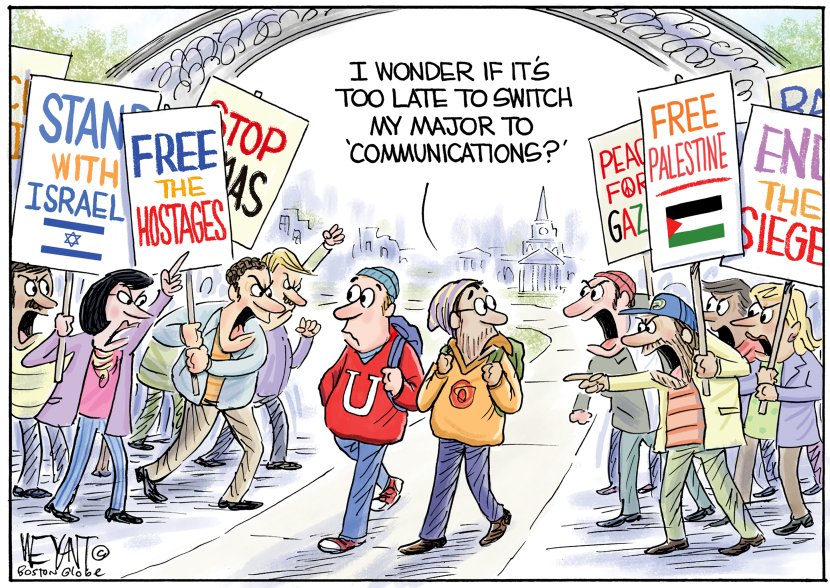
Subscribers Only Content
High resolution image downloads are available to subscribers only.
Not a subscriber? Try one of the following options:
OUR SERVICES PAY-PER-USE LICENSINGFREE TRIAL
Get A Free 30 Day Trial.
No Obligation. No Automatic Rebilling. No Risk.
Thanks to the so-called culture wars, debates about events on college campuses are being employed as useful weapons for attacking the gradual democratization that has occurred in higher education since the 1950s.
Those of us who are academics and see education as crucial should be alarmed at the specter of partisan attacks, not to mention the garish and outlandish headlines that adversely affect many people trying to make sense of and understand their lives.
Academic freedom, a term the American Association of University Professors developed in the mid-20th century, was designed to provide freedom of and protection for the pursuit of knowledge by faculty members, whose primary purpose is to educate, acquire knowledge, and conduct research inside and outside the halls of academia. That lines up with the constitution’s protection of free speech and affirms the necessity of academic freedom to the right to education and the institutional independence of higher education institutions.
Nonetheless, across the nation, attacks on free speech have steadily increased. Over the past few years, right-wing groups opposed to the teaching of critical race theory have tried to undermine such important concepts by attempting to restrict the discussion of history, literature, and other disciplines within the humanities.
Such intense paranoia about supposedly “woke” campuses has materialized into actual laws from Florida to Alabama, where Governor Kay Ivey signed a bill that supposedly limits the teaching of “divisive” topics in the state’s colleges and universities. The bill is similar to Florida’s ban on diversity, equity, and inclusion (DEI) initiatives in public colleges, which was signed into law last May. Both measures are overt attacks on learning that attempt to divorce liberal and progressive beliefs and ideas from the classroom.
The conservative right has been on the warpath in its efforts to curtail academic freedom. According to the The Chronicle of Higher Education, Republican lawmakers have proposed 81 anti-DEI bills across 28 states.
That is why a recent report released by the Lumina Foundation and Gallup about how policies and laws shape college enrollment attracted my intense interest. The report was part of a comprehensive survey about students’ experiences of higher education.
Upon reading the report, I came to one major conclusion: intensely histrionic and dramatized discussions about so-called woke campuses dominating higher education do not correlate with the sentiments or concerns of many, or perhaps, most college students. The report’s key findings expose how grossly distorted our national debate over higher education has become and how out of sync Republican-led public higher education systems are with the majority of college students.
As for supposedly “divisive” concepts the right routinely decries about? It turns out students are interested in such ideas. Most of these students, the report notes, state they do not want limitations on what they can discuss in the classroom. What is more noteworthy is that students’ opinions do not conform with the hyper-political partisanship that saturates and intensely populates headlines.
In interviewing students who are concerned about this issue, some political differences are likely to be expected. However, students are nowhere near as politically stratified as a confluence of outside factors might have led one to believe. In fact, more than 60% of Republicans who care about this issue when selecting a college prefer that states do not restrict instruction on topics related to race and gender (compared to 83% of Democrats and 78% of independents).
College and university campuses are the supposed citadels for the rational examination and exchange of ideas. They should be centers where students have access to specific information shaping current societal discussions and where faculty members are encouraged to engage in their mission as public intellectuals, even when espousing unpopular discourse that exposes harsh realities about the past and present.
I make it clear to my students during the first class of every semester they are no longer in high school and that life is not multiple choice, though it can be somewhat true and false (the latter comment always gets a few laughs). I also inform students none of us will be totally comfortable with everything we encounter or hear, and that as human beings, we must be expected to acclimate to various situations and environments. The fact that people are occasionally taken out of their comfort zones can be a positive thing.
Campuses must make a valiant effort to protect free speech and advocate mutually respectful dialogue. Administrators must make serious and committed efforts to protect the rights of faculty and students who become targets of attack for expressing controversial or unpopular viewpoints. These efforts are crucial, given our current political and societal landscape.
–
Copyright 2024 Elwood Watson, distributed by Cagle Cartoons newspaper syndicate
Elwood Watson is a professor of history, Black studies, and gender and sexuality studies at East Tennessee State University. He is also an author and public speaker.